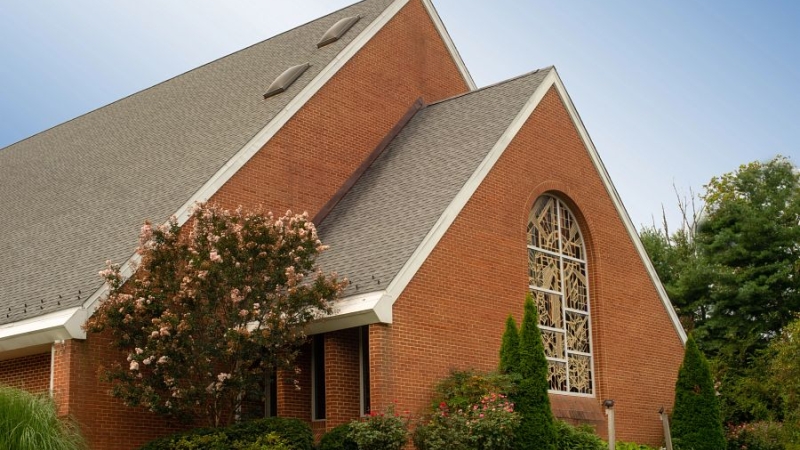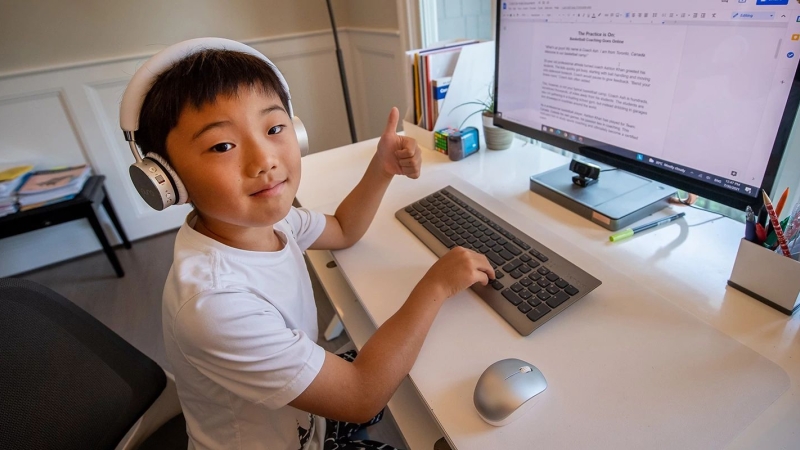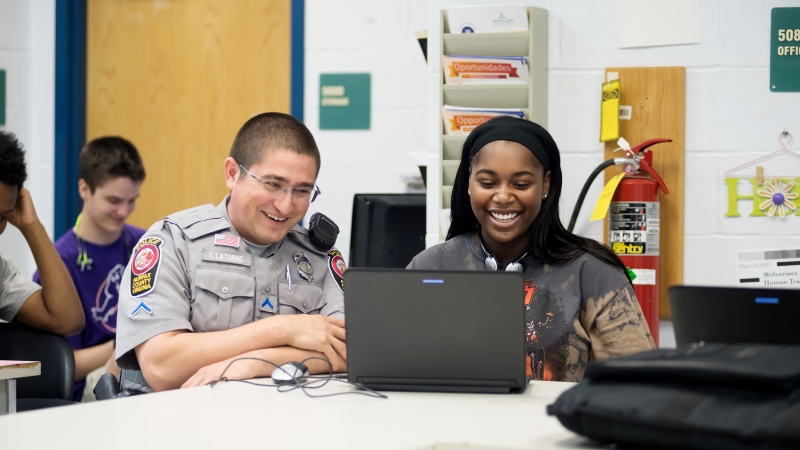
Religious Accommodations in Schools for Students
Resources for Family and Staff
FCPS has developed Regulation 1502, Expectations for Meditation and Silent Reflection Space Accommodations, to ensure all students and staff have reasonable accommodation and access to meditation and silent reflection spaces within the school division. The regulation provides guidance for schools on how to manage requests for silent reflection during instructional and non-instructional time, and for students to leave school for religious activities.
Guidelines for Schools K-12
Student Requests for Accommodations for Meditation and Silent Reflection
Meditation and Silent Reflection Accommodation Space Designation
Each school and office within the district shall provide one meditation and silent reflection space that is easily accessible and adequately accommodates the needs of students for prayer, meditation, or silent reflection, inclusive of their religious or non-religious beliefs. This space should be separate from other areas, if possible, to provide a quiet and peaceful environment for those utilizing the space. This space is available during regular school hours and available to individuals with an accommodation. Supervision, as available, will be provided in the meditation and silent reflection space. Due to safety or supervision issues, a school may not be able to provide a meditation and silent reflection space on a temporary basis but will work with students to accommodate their prayer, meditation, and silent reflection needs.
Meditation and Silent Reflection During Instructional Time
Students are generally expected to stay in class during instructional time. Students are only permitted to use Meditation and Silent Reflection rooms during instructional time when there is an approved accommodation.
Parents/caregivers must provide written permission for a student to miss instructional time for prayer, meditation, and silent reflection. All requests for such accommodations during instructional time should be directed to the school principal or principal designee.
Prayer During Non-Instructional Time
During the non-instructional portion of the school day, students wanting to pray aloud or in the company of others may do so without advance permission in areas open to students, such as the cafeteria during lunch hours, and school grounds during class breaks and before and after school so long as it does not disrupt the educational environment. Students may also use the mediation and reflection spaces for individual or group prayer during non-instructional time. If students require additional space for prayer during the non-instructional portion of the school day, the request should be granted in the same way as such requests are granted for other student gatherings not related to the curriculum. The request should be directed to the principal.
Students may organize prayer groups and other religious clubs just as students are permitted to organize non-curricular student activity groups. Student groups meeting for prayer must comply with the following conditions, regardless of whether they are informal gatherings or student clubs:
- meetings are voluntary and student-initiated
- the group is not sponsored by the school, the government (or its agents), or employees
- employees or agents of the school are present at meetings of the student prayer groups only in a non-participatory capacity for supervision purposes only
- the meeting does not materially or substantially interfere with the orderly conduct of educational activities within the school, and
- nonschool persons do not direct, conduct, control, or regularly attend activities of the student groups.
Use of School Facilities for Student Prayer or Spiritual Practices (During and After School)
Use of Prayer and Reflection Spaces
To ensure students do not face a significant burden in meeting their personal religious obligations, all FCPS schools have designated quiet spaces within the school building that can be reserved for prayer or other reflection. The prayer and reflection spaces are open to be used by students of all faiths and backgrounds without preferences given to a particular faith or spiritual group. In rare cases, building capacity may require the location of the prayer/reflection space to change from day to day as needed, but each school will make best efforts to keep students and staff informed of the location changes as they occur.
The availability of a prayer and reflection space may be impacted by whether sufficient supervision is available and the space needs of a school on a particular day. In those instances, schools may not be able to provide the prayer and reflection space on a temporary basis and will work with individual students on other possible ways to accommodate their prayer needs.
Use of Other FCPS Facilities, Equipment, and Services
Student prayer groups are allowed the same access to facilities, equipment, or services (e.g., bulletin boards, computers, public address system announcements, notices in the school newspaper, yearbook coverage, club fairs, flyer distribution, etc.) as other student groups.
Students who wish to use classroom space to pray after school hours must comply with school system regulations regarding school clubs or community use of facilities in the same manner as other students requesting after-school classroom space for non-curricular activities.
Requests for Students to Leave School Property or Otherwise be Absent
Parents who want their children to leave school property for religious activities during the school day or be absent for the entire day for religious activities must put their request in writing to the principal. Such requests should generally be accommodated; however, if the frequency or duration of absences would materially burden instruction, the principal may deny the request after consulting with Family and School Partnerships.
Students may return to school to take their usual bus transportation home. Principals will apply the usual sign-out and sign-in rules when processing such requests. It is not appropriate for a teacher or administrator to question a student as to the nature of the religious activity. Parents should be informed of the student's responsibility to make up work missed during the religious absence. Teachers should provide assignments and accept makeup work in accordance with reasonable deadlines.
Instructional Accommodations and Nondiscrimination
If parents ask to have their child excused from specific instructional activities that they feel violate their religious beliefs, teachers and principals should consider reasonable alternative activities to meet course objectives. School staff may consult with curriculum specialists in the Instructional Services Department (ISD) to discuss alternatives. Then, the principal and teacher should discuss the proposed alternatives with the parents. Religious accommodations cannot include excusing students completely from courses, course objectives, concepts or ideas, instructional methods, basal resources, testing, or other activities required by state law for graduation. Requests to remove instructional materials or activities from an entire class of students must be presented according to the procedures outlined in Regulation 3009, Challenged Materials.
- Religious Expression in Class Assignments - Students may express their religious beliefs in homework, artwork, and other oral and written assignments, subject to nondiscriminatory academic standards regarding substance, relevance, and other legitimate pedagogical concerns.
- Instructional Information - See Regulation 2234, Student Absences and Attendance
- Student Clothing Associated with Religion - Students may wear clothing associated with their religion or containing a religious message as long as the clothing is consistent with Regulation 2613, Student Dress Code in Public Schools, or additional school guidelines established in accordance with this regulation. If there is a conflict between school guidelines and a student’s religious beliefs, the principal should explore accommodating the student’s religious beliefs. For example, no-hat rules should be modified to allow religious head coverings. In addition, clothing requirements for certain classes such as physical education may be adjusted to accommodate religious beliefs.
- Required Cocurricular Student Activities - Teachers and administrators for courses that require performance activities (e.g., band, theater arts, chorus) should consider accommodations for students who must miss some or all the rehearsals or performances because of religious obligations. The schedule for rehearsals and performances should be publicized as early as possible so that accommodations can be attempted. Teachers should be thoughtful in choosing performance material (song lyrics, drama themes, staging, etc.) and may excuse students from some or all the performance activity if the content conflicts with the student's religious beliefs. Students must not be penalized in their grades for meeting their religious obligations.
- Extracurricular Activities - The purpose of extracurricular activities is to offer all students opportunities to participate in the life of the school. To support this purpose, teachers, administrators, and student leaders should attempt to choose projects and schedule activities so as not to exclude or discourage some students because of their religion. Students may form and attend religious clubs in the same manner as other student-initiated clubs.
- School Level Perfect Attendance Awards - Schools may not withhold perfect attendance awards from students whose only absences have been excused for reasons of religion.
- Requests for Student Placements - The school system will not honor requests for placement or non placement of students into a class based on the teacher's race, sex, religion, national origin, age, or disability.
- Decorations - One of the purposes of decorations in a school or classroom is to display student work. Seasonal decorations with religious themes that are student initiated and produced as part of the instructional program are acceptable. Staff, however, should not display seasonal decorations with religious themes.
- Speakers - Outside speakers who are invited to address classes on subjects related to religion must be informed about Regulation 3280, Controversial Issues, and that their presentation must be related to the instructional program of the class and to objectives in the Program of Studies (POS). The purpose of material presented must be to educate, not to proselytize. Student speeches for graduation or similar events should be reviewed and approved by the principal in advance. The principal should review any concerns about the proposed content (religious or otherwise) with the EER. When students or other private speakers are selected on the basis of content-neutral, evenhanded criteria and retain primary control over the content of their remarks, those remarks are not attributable to FCPS and cannot be restricted because it includes religious or anti-religious content.
FCPS policies and regulations related to religion:
- Policy 1460.4, Religion
- Regulation 1461.2,, Religion
- Regulation 1502, Reflection and Meditation Space Accommodation
Other governing documents are:
- Regulation 2601, Student Rights and Responsibilities, Chapter 1, section A
- U.S. Department of Education Guidance on Constitutionally Protected Prayer and Religious Expression in Public Elementary and Secondary Schools
- Equal Access Act (20 U.S.C. §§ 4071, et seq.)
- First Amendment to the U.S. Constitution
- Elementary and Secondary Education Act (as amended by No Child Left Behind Act), 20 U.S.C. § 7904
While this information provides general guidelines, requests for accommodations to meet religious obligations are addressed on a case-by-case basis to allow consideration of the specific circumstances and the student’s personal religious obligations.
FCPS staff who are seeking religious accommodations can learn more about the process and request an accommodation here.
Forms
FCPS Meditation and Silent Reflection Google Permission Form SY23-24
Parent Guardian Authorization for Silent Reflection Space Access Fillable Form (PDF)





